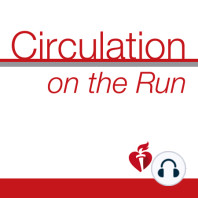20 min listen
Circulation December 15, 2020 Issue
ratings:
Length:
24 minutes
Released:
Dec 14, 2020
Format:
Podcast episode
Description
This week's episode features author Adnan Kastrati and Associate Editor Dharam Kumbhani as they discuss ticagrelor or prasugrel in patients with ST-segment-elevation myocardial infarction undergoing primary percutaneous coronary intervention. TRANSCRIPT BELOW: Dr. Carolyn Lam: Welcome to Circulation on the Run, your weekly podcast summary and backstage pass to the journal and its editors. We're your cohosts. I'm Dr. Carolyn Lam, Associate Editor from the National Heart Center and Duke National University of Singapore. Dr. Greg Hundley: And I'm Dr. Greg Hundley, Associate Editor and Director of the Pauley Heart Center at VCU Health in Richmond, Virginia. Well, Carolyn, this week's feature Ticagrelor Prasmul in patients with ST segment elevation myocardial infarction undergoing primary PCI. More on that story later, though. How about we grab a cup of coffee and look at some of the other papers in the issue. Would you like to go first? Dr. Carolyn Lam: I would. And actually, I'm going to talk about two papers and they're all about BET, BET or promo domain, an extra terminal epigenetic reta proteins. And in particular, this one called BRD4. Now these proteins have emerged as potential therapeutic targets in a number of pathological conditions, including cancer and cardiovascular disease. Small molecular BET protein inhibitors, such as JQ1 have demonstrated efficacy in reversing cardiac hypertrophy and heart failure in preclinical models. Yet genetic studies elucidating the biology of BET proteins in the heart have not been conducted. Well, at least until this week's issue where we have not one, but two papers, both elegantly using mouse genetic studies. Dr. Carolyn Lam: In the first from Dr. Srivastava from Gladstone Institute of Cardiovascular Disease in San Francisco and Dr. Jain from Perlman School of Medicine in Philadelphia and their colleagues, they found that BRD4, that particular BET epigenetic reader protein, forms a transcriptional regulatory module with GATA4, a lineage determining transcription factor in cardiomyocytes. This BRD4 GATA4 module was a critical orchestrator of mitochondrial bioenergetics in the adult heart. Dr. Greg Hundley: Well Carolyn, that is a wonderful summary. What are the clinical implications? Dr. Carolyn Lam: Identification of this new BRD4 interaction partner, such as GATA4 could provide new insights into developing epigenetic based therapies for heart failure. And the second paper is from Dr. Joseph Hill and Thomas Gillette from University of Texas Southwestern Medical Center and their colleagues. And what they found was that BRD4 was essential to the maintenance of mitochondrial electron transport chain function via transcriptional regulation of a nuclear mitochondrial gene network. BRD4 heterozygous deletion resulted in delayed heart failure, whereas pharmacological BRD4 inhibition using JQ1 induced modest changes in mitochondrial genes suggesting potential cardiac toxicity in targeting BRD4 at baseline. Dr. Greg Hundley: So what does this mean for us clinically, Carolyn? Dr. Carolyn Lam: As more potent and specific inhibitors are developed targeting BRD4 for clinical settings in oncology and other diseases, we must carefully monitor bezel cardiac performance for functional and mitochondrial deterioration. Important clinical message there. Dr. Greg Hundley: Great job, Carolyn. Well, my first paper is entitled "An Association Between Immune Checkpoint Inhibitors with Cardiovascular Events and Atherosclerotic Plaques" And it comes to us from Dr. Tomas Neilan and his colleagues at the Mass General Hospital. The study was situated in a single academic medical center. And Carolyn in this paper, there are actually three studies described. First, there's a primary analysis that evaluated whether exposure to an immune checkpoint inhibitor during treatment for cancer was associated with atherosclerotic cardiovascular events among 2,842 patients versus 2,842 controls that were matched by age, a history
Released:
Dec 14, 2020
Format:
Podcast episode
Titles in the series (100)
Circulation December 19/26, 2017 Issue: Circulation Weekly: Your Weekly Summary & Backstage Pass To The Journal by Circulation on the Run
